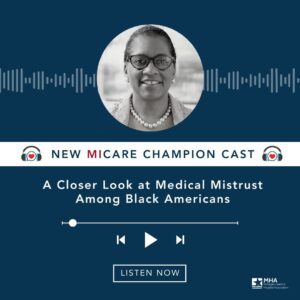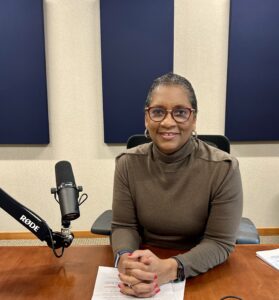

The MHA released a new episode of the MiCare Champion Cast exploring the impact medical mistrust has on health outcomes for Black Americans featuring Lynn Todman, PhD, vice president of Health Equity and Community Partnerships for Corewell Health.
As hospitals and health systems uplift Black History Month, it’s important to acknowledge the long, complex history of medical mistrust among Black Americans that is rooted in systemic racism and countless acts of medical exploitation, unethical experimentation and mistreatment. Repairing trust between Black patients and medical providers requires honest and open dialogue about the lasting impact of injustices that have spanned centuries.
With this in mind, Todman shared further insight about the influence medical mistrust has on Black communities and what action hospital leaders and healthcare teams can take to address gaps in care.
Research has found that individuals who experience medical mistrust are less likely to adhere to treatment plans, engage in routine screenings or participate in medical trials. Mistrust can also play a role in delayed diagnoses and poorer prognoses for a patient, and higher levels of stress that can exacerbate existing health conditions.
“It’s a perfectly rational, protective behavior,” said Todman when speaking about the history of patient-provider mistrust. She notes that systemic change at the organizational, local and national levels are necessary to effectively address this reality for many Black Americans.
Todman, who holds a Masters of Science in City Planning and earned a Doctor of Urban and Regional Planning from MIT, leads efforts to align health equity activities across the integrated health system in her role at Corewell. She has years of experience in leadership and research in health equity, social and structural determinants of health, health impact assessment, urban poverty and community development.
When asked what action providers can take to address mistrust, Todman noted the importance of taking the time to listen and understand the social determinants that may influence a patient’s lifestyle, health, history and access to care.
“We’re starting to hear more around structural competency as a compliment to cultural competency to close gaps [in care],” said Todman. “Understanding people’s cultural background is important, but also understanding the structural forces that make things like housing or food less available…those things are also important.”
MiCare Champion Cast · A Closer Look at Medical Mistrust Among Black Americans
The episode is available to stream on Spotify, YouTube, Apple Podcasts and SoundCloud. Questions or idea submissions for future MiCare Champion Cast episodes can be sent to Lucy Ciaramitaro at the MHA.
